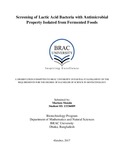Screening of Lactic Acid Bacteria with antimicrobial property isolated from fermented foods
Abstract
The purpose of this study was to isolate and biochemical identification lactic acid bacteria (LAB) with antimicrobial properties from fermented vegetables and dairy products. Twenty LAB isolates were separated from all the isolates which showed bactericidal effect when the agar well diffusion method was carried out to find the antimicrobial activity of the LAB isolates against seventeen (17) test organisms. According to the results of primary screening, the CFS (cell-free supernatants) of the LAB isolates showed antimicrobial effects against the indicator strains in this present work. Out of 20 LAB isolates, 12 were found to successfully inhibit EPEC (atypical) and EPEC (typical) respectively, 11 showed significant effect against Enterobacter cloace, 10 against EAEC, 9 worked against Klebshiella spp., Salmonella typhi & Proteus vulgaris, 8 worked against Shigella flexneri, Streptococcus pyogens, Bacillus subtilis, 7 worked against ETEC & Shigella dysentry, 6 were found to inhibit Escherichia coli, 4 worked against Pseudomonas areuginosa & Streptococcus agalactiae, 3 worked against Streptococcus pneumoniae, 2 showed inhibition against Bacillus cereus. LAB are known to have many health benefits and are mostly used as probiotics. As they can cause inhibition of food pathogens by the reduction of pH due to lactic acid production, hydrogen peroxide production and production of antimicrobial compounds such as bacteriocin. Bacteriocin is a high molecular weight protein. This study suggests that specific vegetables and dairy products contain abundant LAB species and nutrients which could be implemented as probiotic food products, living drugs and as an alternate to antibiotics.

